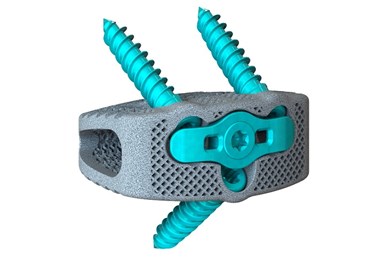Osseus’ 3D Printed Spine Anchors Receive FDA Clearance
The company says the system can be used with both bone screws and alternative fixation bone anchors to enable increased intraoperative flexibility, expulsion resistance and segmental stabilization.

The Pisces-SA is a standalone ALIF platform integrating a highly porous 3D printed interbody system. Photo Credit: Osseus
Osseus, a spinal solutions company, has earned FDA 510(k) clearance for its Pisces-SA Standalone Anterior Lumbar Interbody Fusion (ALIF) Interbody System. The company says the system can be used with both bone screws and alternative fixation bone anchors to enable increased intraoperative flexibility.
According to the company, biomechanical testing proved that the Pisces-SA anchors provide better expulsion resistance and perform comparably with traditional screw-based standalone ALIF constructs in stabilizing injured spinal segments. It is said the system is the first of its kind to provide this level of expulsion resistance and segmental stabilization using an alternative fixation method.
The anchors are said to enable a streamlined, direct anterior approach which facilitates minimal access and improved operational efficiency and versatility.
“I’ve used screws […], and I’ve used the blade-type constructs, but I’ve never used a device where you could make that choice intraoperatively. I really like that ability to make my decision at the time,” says Dr. Michael Hisey, an orthopedic surgeon with the Texas Back Institute in Plano, Texas.
This platform is said to integrate a highly porous 3D printed interbody with anatomical morphology designed for full osseointegration with streamlined instrumentation to facilitate a minimally invasive approach. Osseus says the Pisces-SA sets the new standard for standalone ALIF devices.
“Receiving FDA approval for the Pisces-SA is the culmination of relentless work from our R&D department and surgeon design team,” says Rob Pace, Osseus founder and CEO. “Since our inception, we have pushed the envelope, creating minimally invasive products to help simplify and streamline procedures. This product hits that mark, and we are excited to introduce it to the market.”
Related Content
-
ActivArmor Casts and Splints Are Shifting to Point-of-Care 3D Printing
ActivArmor offers individualized, 3D printed casts and splints for various diagnoses. The company is in the process of shifting to point-of-care printing and aims to promote positive healing outcomes and improved hygienics with customized support devices.
-
3D Printed Spine Implants Made From PEEK Now in Production
Medical device manufacturer Curiteva is producing two families of spinal implants using a proprietary process for 3D printing porous polyether ether ketone (PEEK).
-
Stryker Using Additive for Implants
Using its “AMagine” process, Stryker creates components with a titanium alloy that mimics bone.














